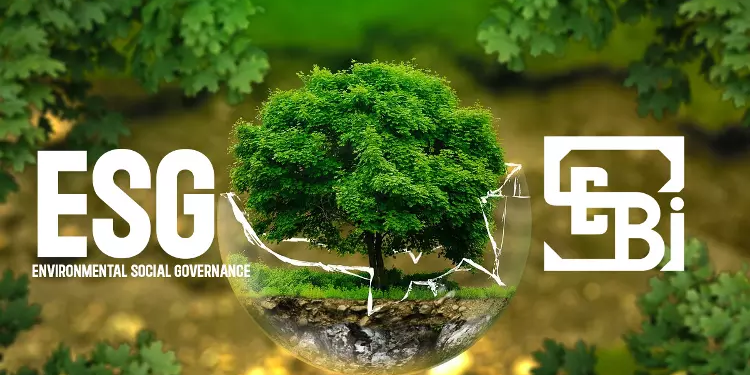SEBI ESG transforms compliance into a competitive edge for Indian startup

Compliance to Competitive Edge: How SEBI’s ESG Norms Are Creating New Market Opportunities for Indian Startups
1. Introduction to ESG and SEBI’s Role
The term, ESG — Environmental, Social, and Governance — has become central to business discussions worldwide. ESG is a framework that helps evaluate how sustainably a company operates.
Environmental: How does business impact the planet?
Social: How does it treat people — employees, communities, customers?
Governance: How strong and ethical is its leadership and decision-making?
The Securities and Exchange Board of India (SEBI) has a vital role in bringing ESG in India. BRSR launched in March 2023, They made explicit: Transparency, accountability, and sustainability are no longer optional.
2. Key Features of SEBI’s New ESG Norms
The Securities and Exchange Board in India (SEBI) introduced the Business Responsibility and Sustainability Reposting (BRSR) groundwork to ensure that Indian companies disclose quantifiable data on sustainability aspects, such as human rights.
India’s environmental, social, and governance (ESG) executive landscape initiated with the launch of the Business Responsibility Reporting (BRR) guidelines in 2009. BRSR came into effect in 2023, is more closely aligned with international standards like the Global Reporting Initiative (GRI) and the Task Force on Climate-related Financial Disclosures (TCFD). Under this, the top 1,000 listed companies in India are required to answer 140 questions- 98 mandatory essential indicators and 42 voluntary leadership indicators.
Can we trust the ESG data companies disclose? That’s the core question SEBI is addressing by introducing third-party assurance. ESG (Environmental, Social, and Governance) factors gain prominence in investment decisions, questions about the reliability of sustainability reporting have taken center stage. Companies frequently emphasize their ESG achievements, but without third-party validation, such claims may lack credibility and open the door to greenwashing.
To address this, SEBI introduced the BRSR Core framework in March 2023, requiring third-party assurance for specific ESG metrics. This step ensures that critical data is backed by evidence, enhancing transparency and trust in the corporate reporting ecosystem.
Why does SEBI’s BRSR Core framework emphasize quantitative ESG metrics? To enhance the clarity, consistency, and reliability of sustainability reporting, SEBI’s BRSR Core framework places strong emphasis on quantitative ESG metrics. The framework requires companies to disclose clear, data-driven ESG metrics like greenhouse gas emissions, energy and water use, waste, and gender wage ratios.
This focus on numbers helps investors compare companies transparently and reduces greenwashing. SEBI’s July 2023 circular stresses these metrics align Indian firms with global ESG standards (SEBI, 2023; KPMG India, 2023; IIBF, 2023). What are Scope 3 emissions? SEBI’s ESG guidelines require companies to report on their supply chain impacts, including Scope 3 emissions — which are indirect greenhouse gas emissions occurring in a company’s value chain, such as emissions from suppliers, transportation, product use, and disposal. This expands accountability beyond direct operations, encouraging firms to manage environmental risks throughout their entire supply chain.
3. Why these Norms Matter- Beyond Compliance
Environmental, Social, Governance (ESG) refers to a comprehensive set of principles and strategies that organisations adopt to minimise negative impacts and foster positive contributions across environmental, societal, and governance domains.
Environment criteria focuses on how a company addresses ecological concerns like emission, resource usage, and pollution.
Social Criteria relate to its treatment of employees, Community engagement, and stakeholder relationships.
Governance Criteria deal with the transparency, structure, and ethical management of the company.
In the dynamic financial environment, investors are no longer focused merely on a company’s balance sheets and profit margins. Progressively, they are looking at how businesses manage their Environmental, Social, and Governance (ESG) responsibilities. To support this shift, Regulators have been working on a structured ESG reporting framework. Internationally, initiatives such as the Global Reporting Initiative (GRI), Climate Disclosure Standards Board (CDSB), and the United Nations Global Compact (UNGC) have become widely adopted. Additionally, the European Union’s ESRS (European Sustainability Reporting Standards) and the UK’s Sustainability Disclosure Requirements (SDR) mandate detailed ESG disclosures and promote responsible business practices.
In India, the Securities and Exchange Board of India (SEBI) introduced the Business Responsibility and Sustainability Report Core (BRSR Core) in July 2023. The framework set a mandatory SG disclosures that must be reported by the top 150 listed companies in India, initiated from the financial year ending March 2024. The BRSR includes key performance indicators (KPIs) across nine ESG attributes– greenhouse gas, water and energy footprint, embracing circularity, enhancing employee well-being, etc.
As a result, Indian companies are stepping up their ESG commitments. Many industries like Infosys, Tata Consultancy Services, Wipro, and Larsen and Toubro have commenced aligning their operations with the BRSR Core framework. Infosys has established a new development centre focused on cloud and AI technologies, aimed at engaging regional talent. The facility, which accommodates around 1,000 employees, is built to green building standards.
Understanding SEBI’s Legal Framework for ESG Regulation
India’s journey commenced in 2009, when the Ministry of Corporate Affairs(MCA) issued guidelines on Corporate Social responsibility. Since then, The ESG has progressed through the introduction of Business Responsibilities Report, National Guidelines on Responsible Business Conduct (NGRBC) and later, the Business Responsibilities and Sustainability Reports (BRSRs).
The Securities and Exchange Board of India (SEBI) initially made it mandatory for the top 100 listed companies by market capitalization to submit BRRs covering their ESG-related performance. In May 2021, SEBI enhanced the framework by introducing the BRSR, replacing the BRR, and the requirement to the top 1,000 listed companies, from the financial year 2022–2023.
In the financial year 2023, SEBI launched its core, underscoring its dedication to fostering transparency and embedding sustainability into corporate reporting. It’s organised into 3 main sector:
- General disclosures;
- Management and process disclosures; and
- Principle–wise performance disclosures.
The BRSR Core also encourages companies to disclose value chain ESG metrics, specifically focusing on key upstream and downstream partners that together represent 75% of their purchase or sales value.
Phased Implementation Timeline for BRSR Core:
- FY2023–24: Top 150 listed entities
- FY2024–25: Top 250 listed entities
- FY2025–26: Top 500 listed entities
- FY2026–27: Top 1,000 listed entities
Why Does ESG Matters?
Companies and stakeholders both benefit from ESG reporting. It makes things more clear and accountable, giving investors, regulators, lenders, and other stakeholders a better understanding of a company’s long-term strategy and how it affects its operations. These disclosures also help businesses find risks, keep track of progress, and make things more efficient. A recent survey by top consulting and research firms found that 75% of Indian businesses now actively report on their ESG and sustainability performance. This shows that more and more businesses are committed to doing business in a responsible way.
4. Implications For Indian Startups
In today’s era of business environment, Indian companies are facing more than just market competition. They operate in an ecosystem where customers, investors, regulators, and employees are demanding greater transparency, ethical practices, and accountability. In this context, aligning purpose with profit is no longer an exalted ambition — it has become essential for long-term success.
Environment, Social, and Governance (ESG) come into play. It’s a core strategic apparatus that drives innovation, resilience, and long-term goals. Internationally, ECG-driven investing has surged, and In India too, Conversation around business has moved to the mainstream boardroom discussion.
The Securities and Exchange Board of India(SEBI) has made ESG report mandatory for the Business Responsibility and Sustainability Report (BRSR), It helps companies to focus on the impact across environmental and social dimensions. ESG drives innovation, efficiency, and strengthening governance practices.
Prominent companies are already benefiting: Mahindra promotes Clean Mobility and rural projects, Infosys strives for carbon neutrality and inclusive growth, and Tata integrates sustainability across sectors. ESG readiness is evolving from a moral imperative to a practical business advantage, positioning businesses for long term relevance, profitability, and global competitiveness.
5. How founder can build Genuinely sustainable startups
Materiality assessments have conflated as vital equipment for shaping ESG ( Environmental, Social, and Governance) strategies, as companies tackle upcoming pressure from regulators, investors, and the public. What commenced as a financial reporting has now matured into a part of sustainability planning, assisting businesses identify. ESG topics matter most for their operations, stakeholders, and long-term performance. Frameworks like the GRI, SASB, and more recently the EU’s CSRD and ESRS, are pushing companies to embrace a “ double materiality” view. These evaluations need to take into account broader societal issues, external stakeholder input, and internal company interests. Data-driven is becoming more data-driven, dynamic, and thanks to technology like digital engagement platforms and artificial intelligence. Additionally, the scope is broadening to value chain hazards like Scope 3 emissions and labor practices. Their strategic value is being further enlarged by industry specific frameworks and a closer integration of enterprise risk management and ESG. A materiality assessment is a forward-looking process that empowers businesses to manage risk, embrace sustainability, and develop long-term resilience.
6. Challenges Startups Might face
For Indian startups, the road toward ESG is far from simple, with inadequate resources and limited expertise standing as the most significant obstacles. Startups in the early stage lack sustainability teams, digital tools to track emissions or employee data, and the financial capacity to hire external experts. Even when they are able to accumulate relevant metrics, understanding SEBI’s guidelines and aligning with the client requirement calls for expertise that is not available in the smaller startups. Additionally, Founders face the challenge of balancing business like scalping and fundraising with long-term ESG. Rapid scalping can result in higher carbon emission, more complex supply chains, greater labour-related risks. It may conflict with ESG standards. Founders need to vigilantly evaluate growth opportunities against their capacity to establish proper controls and ensure transparent, verifiable reporting, especially as major clients are placing greater emphasis on verifiable ESG disclosures. These challenges turn ESG into a strategic balancing art, rather than a straightforward compliance requirement.
7. Future Outlook
As ESG becomes integral to corporate strategy, startups will face expectations that go beyond basic compliance. ESG is fast becoming a standard in funding rounds, with investors. Additionally, demanding robust sustainability data, governance practices, and social impact disclosures. Startups must establish a transparent report early to stay investment-ready. Furthermore, regulatory spillover from publicity listed entities to privately held firms is poised to escalate, as prominent clients increasingly mandate verifiable, audit- compliant ESG disclosures from their supply chain partners. In response, there’s growing momentum for ESG ratings and frameworks tailored to startups and SMEs — offering scalable, resource-sensitive solutions that foster credibility without overburdening them. Together, these trends position ESG as a vital pillar of growth, capital access, and long-term viability for emerging ventures.


